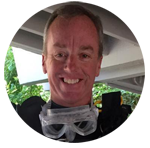Our Mission
The mission of CSUMB's Marine Science Research program, formerly the Institute for Applied Marine Ecology (IfAME), is to develop clear linkages between ecological phenomena and potential and realized management regimes along the California coast, across the US, and throughout the world. Using cutting-edge technology, the goal of the Marine Science Research program is to provide insight, to reorganize thinking, and to improve paradigms for understanding the interaction of marine ecological systems and human activities.
The Need
The need for the Marine Science Research program is predicated on two persistent challenges within the marine science and management community:
• A significant disconnect between much of the science conducted by academia and the actual needs of those responsible for management and policy development. Well-intentioned academic efforts often fall short in addressing specific government needs due to a fundamental lack of understanding as to how the government functions and what its precise needs are. Government agencies, in turn, responding to the exigencies of management, are often compelled to act without communicating with academic scientists to determine precisely what data are available or needed.
• Insufficient financial support from either State or Federal agencies directed towards conducting the critical science necessary to underlie major policy initiatives. These unfunded mandates undermine the success of the initiatives and ultimately the marine environment loses.
The Vision
The Marine Science Research program addresses the expressed disconnect through the conduct of strategically-planned, user-driven scientific research in support of specific manager and decision-maker needs. Specifically, agency employees are frequently engaged directly in the planning, execution, and/or analysis of field research projects. In this way, the transition from completed science to realized management and/or decision-making is streamlined.
The Marine Science Research program addresses this challenge of limited financial support by engaging a continuous stream of undergraduate and graduate research assistants in the conduct of all our projects. In this way, the students are direct participants in the execution of applied research projects, while the government agencies effectively expand the footprint of what they are able to take on by collaborating with our program.
The Approach
The CSUMB faculty of marine science developed a restructured organizational design that sustainably couples the strong extramural research programs, growing academic curriculum, and established community engagement programs.
The Marine Science Research program presents a unified public face and serves as the primary vehicle for linking the Marine Science Curriculum, regional community engagement programs, and external partnerships.
Facilities & Operations

SMALL BOATS PROGRAM
><> Program Contact: Dr. Steve Moore, stmoore@csumb.edu

SCIENTIFIC DIVING
><> CSUMB Research Diving Program website
><> The MSCI 380 course provides training techniques for scientific divers.
LAB & FIELD EQUIPMENT
><> Ecosytem Electronics Lab Resources
><> Marine Landscape Ecology Tools
><> Image Analysis Lab
GEOSPATIAL RESOURCES
><> csumb.edu/gis

DATA PORTALS
><> Seafloor Mapping Lab Data Library
><> California Undersea Imagery Archive (CUIA)
><> SCID: Sanctuary Characterization Tool
><> Integrated Time-series Data (future)
><> CeNCOOS Portal
Marine Science Team

James Lindholm
jlindholm@csumb.edu
www.jameslindholm.com
831.582.4662
Image Analysis Lab
California Undersea Imagery Archive

Corey Garza
cogarza@csumb.edu
831.582.3024
Marine Landscape Ecology Lab

Alison Haupt
ahaupt@csumb.edu
831.582.3682
Coastal Ecology Lab

Cheryl Logan
clogan@csumb.edu
831.582.4698
Environmental Physiology Lab

Steve Moore
stmoore@csumb.edu
831.582.3775
Ecosystem Electronics Lab

Sherry Palacios
spalacios@csumb.edu
831.582.3657
Biological Oceanography Lab

Andrew DeVogelaere
Andrew.DeVogelaere@noaa.gov
831.647.4213
MBNMS Research Coordinator
Marine Science Research & Programmatic Staff
- Carrie Bretz
Marine Science Research & Rote Program Manager - Laura Good, Ph.D
Coastal & Marine Ecosystems Program (CMEP) Education Director - Sarena Hineser-Harwood
Administrative Support Coordinator - Pat Iampietro
Marine Geospatial Technology Officer - Sloane Lofy
Dive Safety Officer - Kameron Strickland
CUIA Video Archvist - Andrew Morgan
Dive Safety Officer - Paulina Salinas-Ruiz
MSCI Lecturer
